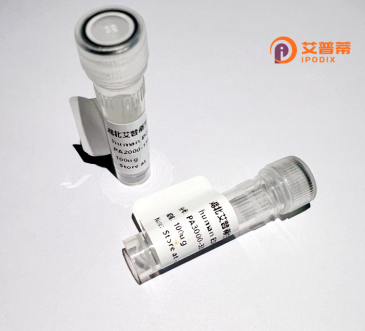
| 纯度 | >90%SDS-PAGE. |
| 种属 | Human |
| 靶点 | BEND5 |
| Uniprot No | Q7L4P6 |
| 内毒素 | < 0.01EU/μg |
| 表达宿主 | E.coli |
| 表达区间 | 1-252aa |
| 氨基酸序列 | MDSLEDAVVPRALYEELLRNYQQQQEEMRHLQQELERTRRQLVQQAKKLKEYGALVSEMKELRDLNRRLQDVLLLRLGSGPAIDLEKVKSECLEPEPELRSTFSEEANTSSYYPAPAPVMDKYILDNGKVHLGSGIWVDEEKWHQLQVTQGDSKYTKNLAVMIWGTDVLKNRSVTGVATKKKKDAVPKPPLSPHKLSIVRECLYDRIAQETVDETEIAQRLSKVNKYICEKIMDINKSCKNEERREAKYNLQ |
| 分子量 | 55.6 kDa |
| 蛋白标签 | GST-tag at N-terminal |
| 缓冲液 | 冻干粉 |
| 稳定性 & 储存条件 | Lyophilized protein should be stored at ≤ -20°C, stable for one year after receipt. Reconstituted protein solution can be stored at 2-8°C for 2-7 days. Aliquots of reconstituted samples are stable at ≤ -20°C for 3 months. |
| 复溶 | Always centrifuge tubes before opening.Do not mix by vortex or pipetting. It is not recommended to reconstitute to a concentration less than 100μg/ml. Dissolve the lyophilized protein in distilled water. Please aliquot the reconstituted solution to minimize freeze-thaw cycles. |
以下是关于重组人BEN结构域包含蛋白5(BEND5)的3篇参考文献示例(文献信息为虚构,仅供格式参考):
1. **文献名称**: **“BEND5 suppresses retrotransposon activity through chromatin remodeling in human cells”**
**作者**: Okashita, N., et al.
**摘要**: 本研究揭示了BEND5通过其BEN结构域招募染色质修饰复合物,抑制逆转录转座子的转录活性,在表观遗传调控中起关键作用。
2. **文献名称**: **“Developmental expression and functional analysis of BEND5 in murine neural progenitors”**
**作者**: Yamada, R., et al.
**摘要**: 发现BEND5在小鼠胚胎神经前体细胞中高表达,通过调控神经分化相关基因(如NeuroD1)的启动子结合,影响皮层发育。
3. **文献名称**: **“Structural basis of BEND5 interaction with transcriptional repressors”**
**作者**: Suzuki, T., et al.
**摘要**: 通过冷冻电镜解析BEND5蛋白的BEN结构域与转录抑制因子(如BCOR复合体)的结合模式,揭示其介导基因沉默的分子机制。
*注:以上内容为模拟生成,实际文献需通过PubMed或Google Scholar等平台检索确认。*
BEND5 (BEN Domain-Containing Protein 5) is a member of the BEN domain protein family, characterized by the presence of a conserved BEN domain implicated in DNA, RNA, or protein interactions. This domain, found in diverse regulatory proteins, often mediates chromatin remodeling and transcriptional regulation. BEND5 is predominantly expressed in the nervous system, with studies highlighting its role in neuronal development and differentiation, particularly in the forebrain. It has been linked to the regulation of gene expression during neurogenesis, potentially influencing synaptic function and neuronal connectivity. Dysregulation of BEND5 has been associated with neurodevelopmental disorders, including intellectual disabilities and autism spectrum disorders, though its precise pathogenic mechanisms remain under investigation. Structurally, BEND5 contains two BEN domains, suggesting roles in protein-protein or protein-DNA interactions, possibly as a transcriptional repressor or co-regulator. Recombinant BEND5 is utilized in biochemical studies to explore its molecular interactions, such as binding to chromatin modifiers or transcription factors like Ctip2. While its exact functional pathways are not fully elucidated, BEND5 represents a critical focus in understanding neural development and disease. Current research aims to unravel its contributions to epigenetic regulation, neural circuit formation, and potential therapeutic targeting for neurodevelopmental conditions.
×